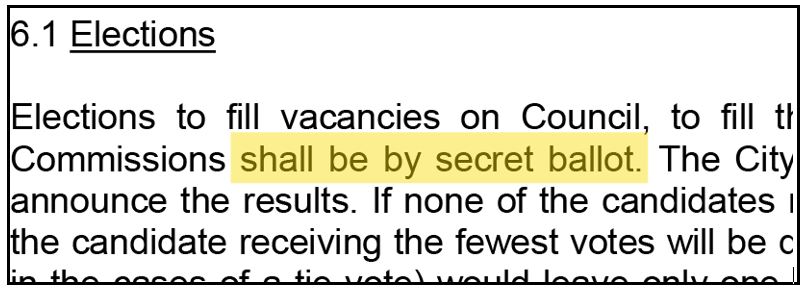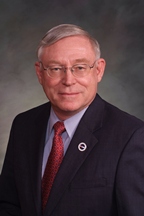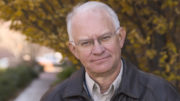By Jeffrey A. Roberts
CFOIC Executive Director
Despite a 2012 Sunshine Law amendment that bans the use of secret ballots to make most decisions, some municipal governments in Colorado have continued to fill city council vacancies by voting anonymously.
We’ve written several times about a citizen’s lawsuit against Arvada for using secret ballots in January 2014 to eliminate candidates for the District 1 council seat now occupied by Jerry Marks.
Recently we learned that Westminster, Thornton, Montrose, Fort Lupton, Florence and Woodland Park also filled council vacancies recently using procedures that hid how each council member voted. And on Tuesday evening of this week, the city and county of Broomfield used secret ballots to replace a council member who resigned in March.
“It’s troubling that after multiple lawsuits and the unanimous passage of multiple bills by the state legislature, cities still use secret ballots,” said Russell Weisfield, the Arvada resident whose lawsuit against his city was reinstated by the Colorado Court of Appeals earlier this month. “If nothing else, the public should be greatly concerned by elected officials who cravenly hide their votes.”
It was Weisfield who noticed, while researching another matter, that the Westminster council used a procedure remarkably similar to Arvada’s when it chose Maria De Cambra to fill the seat of Faith Winter, who was elected to the state House last November. When Weisfield requested the results of each round of voting, he was told the city “has no records that are responsive to your request.” But this week, following additional questions from Weisfield and the Colorado Freedom of Information Coalition, Westminster released the exact tally.
“Going forward we will provide that extra level of detail,” said City Attorney David Frankel, adding that the City Council will be asked to amend the minutes of its Jan. 26 meeting to show how each councilor voted.
Weisfield wasn’t able to make such a difference in Broomfield. Just prior to Tuesday’s vote, Mayor Randy Ahrens announced that “council’s procedures and rules of order provides that the election to fill the vacancy shall be by secret ballot.” Weisfield spoke up at the meeting, noting that the legislature had passed a law forbidding the use of secret ballots to fill vacancies and urging the council to “comply with the Open Meetings Law and not use secret ballots – that is, identify whom you are voting for.”
“If there was a way for the audience to see how they voted it was not obvious to me,” Weisfield said after the council held one round of balloting before formally appointing David Beacom to the Ward 5 council seat. Broomfield also used secret ballots to fill an earlier council vacancy on Jan. 28, 2014.
The secret ballots ban in the state Open Meetings Law, aka the Sunshine Law, stems from a lawsuit filed by businessman Ronald Henderson, who objected when the Fort Morgan City Council used anonymous written ballots to appoint two council members and a municipal judge in 2009 and 2010. In 2012, after the Court of Appeals ruled in the city’s favor, the legislature prohibited any state or local public body (such as a city council) from using secret ballots to adopt “any proposed policy, position, resolution, rule, or regulation” or to take “formal action.” An exception: Public bodies are allowed to use secret ballots to choose their own leadership.
“We were pretty clear in our legislative intent,” said Bob Gardner, the former state representative from Colorado Springs who sponsored the 2012 bill. “We intended total transparency in the filling of those vacancies … Everyone should have to man up and say, ‘I’m for Joe and not for Harry’ and that’s the way it is.”
But Thornton City Attorney Margaret Emerich said the Thornton city charter, which was adopted by voters in that suburb, dictates the balloting procedure used Jan. 13 to install council member SomXai Vue. And because filling a council vacancy is a matter of local concern, she said, home-rule municipalities such as Thornton are not required to follow the 2012 statute. (When Weisfield requested Thornton’s results, which aren’t detailed in the council’s minutes, he was told the ballots “would not contain the information you are seeking.”)
The city of Arvada’s motion to dismiss Weisfield’s case makes an argument similar to Emerich’s: “As this is an issue of a municipal election … the Colorado Constitution leaves the procedural requirements to the municipality.”
But Chris Beall, the media lawyer who represented Henderson in the Fort Morgan suit, noted that the Sunshine Law clearly says that open government meetings are a matter of “statewide concern.” The law is meant “to provide transparency to all the citizens of Colorado,” Beall said.
“In that respect, transparency knows no borders, and it is a right held by all Colorado citizens. In such circumstances, a local municipality cannot preempt that right based on its own parochial considerations.”
Woodland Park has filled two council vacancies since last summer, using a secret ballot to select a new mayor in August but then deciding not to hide its votes when another council slot opened up in March. City Manager David Buttery said the city attorney blessed both approaches.
There are recent examples of city councils that filled vacancies the way the 2012 legislation intended.
Watch the Dec. 22, 2014, video of the Pueblo City Council choosing the successor for a council member who resigned and you’ll hear the city clerk announce how each councilor voted. Minutes of the Dec. 15, 2014, meeting of the Colorado Springs City Council include a detailed tally of how each councilor ranked candidates for the District 2 seat.
Ouray and Louisville also announced how council members voted when they filled vacancies recently.
Follow the Colorado Freedom of Information Coalition on Twitter @CoFOIC. Like CFOIC’s Facebook page. Do you appreciate the information and resources provided by CFOIC? Please consider making a tax-deductible donation.






